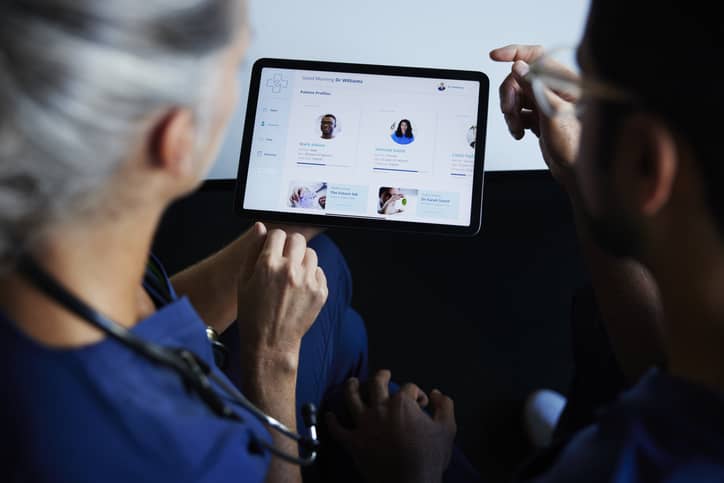In recent years, the U.S. healthcare industry transitioned from paper to digital recordkeeping by hospitals, doctor’s offices, clinics and nursing facilities. The federal government and health organizations invested billions of dollars to fund the hardware, software and training necessary to complete the changeover.
The mandated switch to electronic records garnered plenty of news coverage, with stories about electronic health records (EHR) and electronic medical records (EMR) peppering both medical and mainstream publications. The terms are often used interchangeably, which can lead to confusion. However, there are distinct differences between EHR and EMR.
What is an EHR?
An electronic health record is also a digital version of a patient chart, but it is a more inclusive snapshot of their medical history. Electronic health records are designed to be shared with other providers, so authorized users may instantly access a patient’s EHR from across different healthcare providers.
EHRs serve as a sort of centralized location for healthcare providers to gain increased accessibility into patient information. They offer a comprehensive view of a patient’s health status and history so healthcare providers can make better informed decisions regarding possible diagnoses, treatments and ongoing care plans.
What is an EMR?
An electronic medical record is a single practice’s digital version of a patient’s chart. An EMR contains the patient’s medical history, diagnoses and treatments by a particular physician, nurse practitioner, specialist, dentist, surgeon or clinic.
EMRs replace traditional paper-based medical records, allowing healthcare providers and organizations to collect and manage patient data more efficiently while empowering them to enhance patient care. These records typically hold a variety of information, including:
- Personal information like name, age, contact and insurance info.
- Medical history including illnesses, surgeries, vaccination records and family history.
- Clinical notes from physicians.
- Test and report results.
- Records of medications prescribed.
- Treatment plans.
What’s the Difference Between EHR and EMR?
It’s easy to remember the distinction between EHRs and EMRs, if you think about the term “health” versus the term “medical.” An EHR is a more comprehensive report of the patient’s overall health, while an EMR is a narrower view of a patient’s medical history.
Here are a few more ways EHRs and EMRs differ:
|
EHR (Electronic Health Records) |
EMR (Electronic Medical Records) |
|
A more comprehensive digital view of a patient’s health history |
Digital version of a patient’s paper-based, basic medical records and information |
|
Optimized transferability between healthcare organizations |
Limited transferability between healthcare organizations |
|
Patient history can move to new practices as the patient moves |
Patient history stays within the health practice |
|
Used for decision-making |
Used for diagnosis and treatment plans |
Advantages and Disadvantages of EHR and EMR
While both EHRs and EMRs are digital records holding medical information for patients, both come with their sets of advantages and disadvantages as they pertain to how healthcare professionals utilize and leverage them.
The benefits of EHRs include:
- Streamlined sharing of updated, real-time information between institutions and healthcare providers.
- A complete medical history of the patient, from allergies and radiology images to lab results.
- Access to tools that providers can use for decision-making such as clinical guidelines and alerts.
The disadvantages to EHRs are:
- Complex and costly technical implementation and integration processes.
- Technical issues resulting from a heavy reliance on technical infrastructure which could impact accessibility to data and overall patient care.
- A poor user experience of this software can cause frustration for healthcare professionals.
EMRs offer several advantages over paper records, such as:
- Better data tracking over time with increased record management efficiency.
- Reduction in risk of medical errors or damaged patient information documents.
- Streamlined workflow with digitized scheduling, automated reminders and electronic prescribing.
But, EMRs do have their limitations and risks as well, including:
- Restricted data sharing with different institutions or healthcare providers.
- Limited patient health history.
- Cybersecurity and privacy concerns.
EHRs and EMRs both contain particular advantages and disadvantages. It is up to healthcare organizations to make informed decisions as to which one works better for their service and overall processes.
Do Hospitals Use EHRs or EMRs?
Hospitals tend to use EHRs over EMRs for a variety of reasons. EHRs differentiate themselves from EMRs from their level of comprehensive patient data and the ability to exchange data more seamlessly. This can result in deeper understanding of patients and their needs, leading to improved patient care. EMRs are still used in clinician offices, clinics and hospitals, but EHRs provide a much more detailed health history from all clinicians a patient has been served by and are more easily transferable between institutions.
Benefits of Electronic Records in Healthcare
Both EHRs and EMRs offer benefits to patients and healthcare providers:
- With fast, accurate and updated information, medical errors can be reduced and health care improved.
- Patient charts are more complete and clearer – no more deciphering illegible scribbles.
- Information sharing can reduce duplicate testing, saving patients and providers time, money and trouble.
- Improved information access makes prescribing medication safer and more reliable.
- Promoting patient participation can encourage healthier lifestyles and more frequent use of preventative care.
- More complete information means more accurate diagnoses.
Electronic records are expected to make healthcare more efficient and less costly, making the switch a good investment for our nation’s healthcare.
Leverage EHR and EMR Knowledge Toward Your Future
Understanding EHRs and EMRs is vital to the role of healthcare informatics and healthcare analytics professionals. USF Health’s Morsani College of Medicine offers online master’s degrees and graduate certificates designed to sharpen your skills and knowledge in the healthcare field so you can make a difference in the dynamic, fast-paced healthcare industry. Ready to take the next step in your healthcare education? Start your application now.




